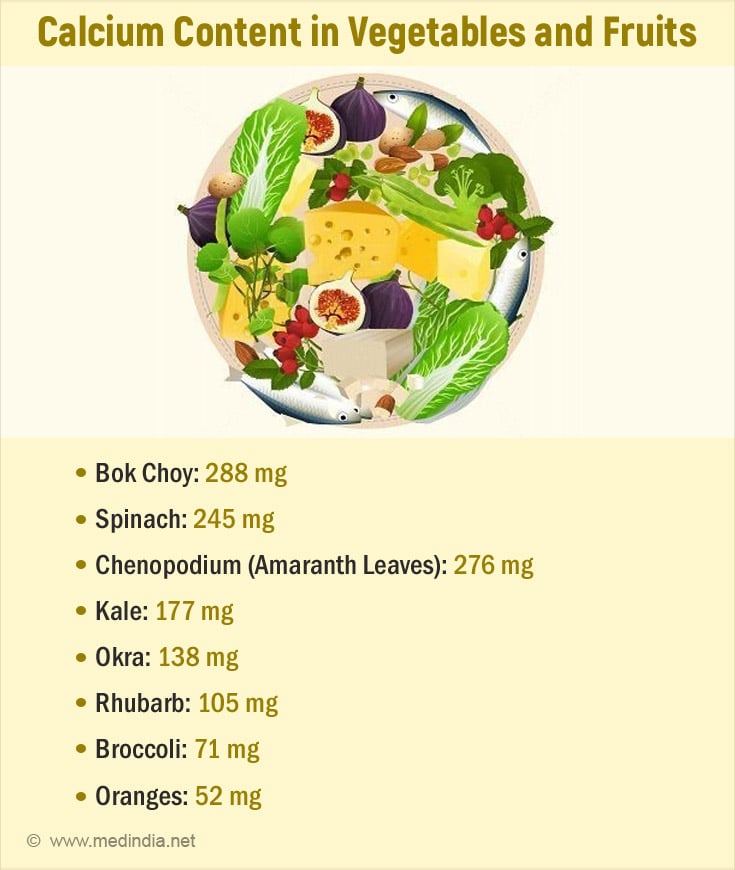- BABY BOK CHOY - (https://fdc.nal.usda.gov/fdc-app.html#/food-details/2486573/nutrients)
- Spinach, cooked, boiled, drained, without salt - (https://fdc.nal.usda.gov/fdc-app.html#/food-details/168463/nutrients)
- Amaranth leaves, cooked, boiled, drained, without salt - (https://fdc.nal.usda.gov/fdc-app.html#/food-details/169202/nutrients)
- Kale, cooked, boiled, drained, without salt - (https://fdc.nal.usda.gov/fdc-app.html#/food-details/169238/nutrients)
- Figs, dried, uncooked - (https://fdc.nal.usda.gov/fdc-app.html#/food-details/174665/nutrients)
- Okra, cooked, boiled, drained, without salt - (https://fdc.nal.usda.gov/fdc-app.html#/food-details/169261/nutrients)
- Rhubarb, raw - (https://fdc.nal.usda.gov/fdc-app.html#/food-details/167758/nutrients)
- Broccoli, cooked, boiled, drained, without salt - (https://fdc.nal.usda.gov/fdc-app.html#/food-details/169967/nutrients)
- Oranges, raw, all commercial varieties - (https://fdc.nal.usda.gov/fdc-app.html#/food-details/169097/nutrients)
About
Calcium is a crucial mineral for maintaining healthy bones, teeth, muscle function, and nerve transmission. While dairy products are well-known sources of calcium, many vegetables and fruits also provide significant amounts of this essential nutrient.
Top Nine Calcium-rich Vegetables and Fruits
1. Bok Choy
Bok choy provides about 288 mg of calcium per cup when cooked. It is also rich in vitamins A and C, contributing to immune health(1✔ ✔Trusted Source
BABY BOK CHOY
Go to source).
Recommended Serving Size: 1 cup of cooked bok choy.
Recipes and Meal Ideas
Stir-Fried Bok Choy: Stir-fry bok choy with soy sauce, garlic, and ginger.
Bok Choy Soup: Add bok choy to vegetable or miso soup for added nutrients.
Grilled Bok Choy: Grill bok choy with a bit of olive oil and sesame seeds.
2. Spinach
Spinach is high in calcium, providing around 245 mg per cup of cooked spinach. It also contains iron, vitamins A and K(2✔ ✔Trusted Source
Spinach, cooked, boiled, drained, without salt
Go to source).
Recommended Serving Size: 1 cup of cooked spinach.
Recipes and Meal Ideas
Spinach and Mushroom Quiche: Incorporate spinach into a quiche with mushrooms and cheese.
Spinach Smoothie: Blend spinach with banana, almond milk, and a touch of honey.
Spinach Pesto: Make a pesto using spinach, nuts, olive oil, and Parmesan cheese.
3. Chenopodium (Amaranth Leaves)
Chenopodium, or amaranth leaves, offers approximately 276 mg of calcium per cup of cooked leaves. It is also high in protein and essential vitamins(3✔ ✔Trusted Source
Amaranth leaves, cooked, boiled, drained, without salt
Go to source).
Recommended Serving Size: 1 cup of cooked chenopodium.
Recipes and Meal Ideas
Amaranth Leaf Soup: Add amaranth leaves to vegetable soup for a nutrient boost.
Stir-Fried Chenopodium: Stir-fry with garlic, soy sauce, and vegetables.
Amaranth Leaf Salad: Use fresh amaranth leaves in a salad with avocado and citrus dressing.
4. Kale
Kale provides approximately 177 mg of calcium per cup of cooked kale. It is rich in vitamins A, C, and K(4✔ ✔Trusted Source
Kale, cooked, boiled, drained, without salt
Go to source).
Recommended Serving Size: 1 cup of cooked kale.
Recipes and Meal Ideas
Kale Salad: Toss kale with avocado, nuts, and a lemon vinaigrette.
Kale Chips: Bake kale leaves with a bit of olive oil and sea salt for a crunchy snack.
Kale Smoothie: Blend kale with pineapple, banana, and coconut water.

5. Figs
Dried figs are a valuable source of calcium, with around 162 mg per 100 grams. They are also high in fiber and antioxidants.
Recommended Serving Size: 100 grams of dried figs(5✔ ✔Trusted Source
Figs, dried, uncooked
Go to source).
Recipes and Meal Ideas
Fig and Nut Energy Balls: Blend dried figs with nuts and seeds to make energy balls.
Fig Salad: Combine fresh figs with mixed greens, goat cheese, and walnuts.
Fig Compote: Cook figs with a bit of honey and cinnamon to make a compote for yogurt or desserts.
6. Okra
Okra contains about 138 mg of calcium per cup of cooked okra. It is also high in fiber and essential vitamins.
Recommended Serving Size: 1 cup of cooked okra(6✔ ✔Trusted Source
Okra, cooked, boiled, drained, without salt
Go to source).
Recipes and Meal Ideas
Okra Stir-Fry: Stir-fry okra with tomatoes, onions, and spices.
Okra Gumbo: Add okra to a hearty vegetable gumbo.
Grilled Okra: Toss okra with olive oil and grill until tender.
7. Rhubarb
Rhubarb is an exceptional source of calcium, offering about 105 mg per cup of cooked rhubarb. It also provides fiber and vitamin K, contributing to digestive health and bone strength(7✔ ✔Trusted Source
Rhubarb, raw
Go to source).
Recommended Serving Size: 1 cup of cooked rhubarb.
Recipes and Meal Ideas
Rhubarb Pie: Use rhubarb in a classic pie recipe with a whole grain crust.
Rhubarb Jam: Make a tangy jam to spread on toast or use as a filling for pastries.
Rhubarb Smoothie: Blend cooked rhubarb with yogurt, honey, and berries for a refreshing drink.
Did You Know?
Rhubarb offers a whopping 348 mg of calcium per cup of cooked servings! #rhubarb #calciumrich #medindia
8. Broccoli
Broccoli, cooked, boiled, drained, without salt
Go to source).
Recommended Serving Size: 1 cup of cooked broccoli.
Recipes and Meal Ideas
Broccoli Stir-Fry: Stir-fry broccoli with tofu, bell peppers, and a savory sauce.
Broccoli Soup: Make a creamy broccoli soup with vegetable broth and a touch of cream.
Roasted Broccoli: Roast broccoli with olive oil, garlic, and lemon zest.
9. Oranges
Oranges provide about 52 mg of calcium per fruit. They are also an excellent source of vitamin C, which supports immune health(9✔ ✔Trusted Source
Oranges, raw, all commercial varieties
Go to source).
Recommended Serving Size: 1 medium orange.
Recipes and Meal Ideas
Orange and Almond Salad: Combine orange segments with mixed greens, almonds, and a citrus dressing.
Orange Smoothie: Blend oranges with spinach, banana, and Greek yogurt for a refreshing drink.
Orange Marmalade: Make a homemade marmalade to enjoy on toast or as a filling for pastries.
Incorporating these calcium-rich vegetables and fruits into your diet can help meet your daily calcium needs while offering a range of additional nutrients. Each food provides unique health advantages. By including a variety of these options in your meals, you can support strong bones and overall health while enjoying diverse and delicious flavors.









